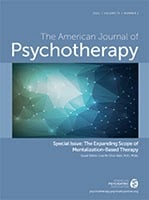Noting that "psychotherapy skills are at the core of clinical psychiatry," and with several forms...
Residency Directors Should Encourage, Support Personal Psychotherapy as Part of Training

Physicians training to be psychiatrists should be encouraged to seek psychotherapy for themselves, not only for the sake of their own mental health, but because it will make them better, more empathic psychiatrists, according to a Viewpoint in the American Journal of Psychotherapy.
“Personal psychotherapy is both a personal and professional endeavor,” wrote Megan E. Pruette, M.D., a clinical assistant professor of psychiatry at the University of North Carolina School of Medicine. “Therapists who have engaged in personal psychotherapy report reduced psychological distress, greater self-acceptance, better self-care, greater authenticity, improved job performance, and enhanced self-awareness, and they hope for similar improvements in their patients.” Engaging in personal psychotherapy also allows trainees to gain a better understanding of what it’s like to be on “the other side of the couch.”
There are several steps that training directors can take to create a culture of acceptance for residents seeking their own psychotherapy, Pruette wrote.
A survey of psychiatry residents indicated that time and finances were the most common reasons for residents not to engage in personal psychotherapy. Pruette suggested that training directors can help residents by providing a list of local therapists who accept residents’ insurance or are willing to work with residents on a sliding scale. She noted that some residency programs have taken these steps and seen an increase in the number of residents who engage in personal psychotherapy.
“If the importance of personal psychotherapy is emphasized and discussed openly throughout the residency, it will take away the stigma and shame that are sometimes associated with personal psychotherapy,” Pruette wrote. “Seeking personal psychotherapy should be encouraged and praised as an important part of training, not viewed as something to do only when there is a problem. Residency directors should talk to residents about the importance of personal psychotherapy as a part of their training,” and be understanding of the time needed to engage in personal psychotherapy.
Engaging in personal psychotherapy will enable psychiatrists in training to better understand their patients and the struggles they encounter, Pruette wrote. “Therapy is inherently difficult and uncomfortable at times. … Experiencing this discomfort increases clinicians’ understanding of the pain and challenges their patients face and fosters their empathy, respect, and compassion.”
For related information, see the Psychiatric News article “Supporting Psychotherapy Training in Residency.”
(Image: iStock/SDI Productions)







